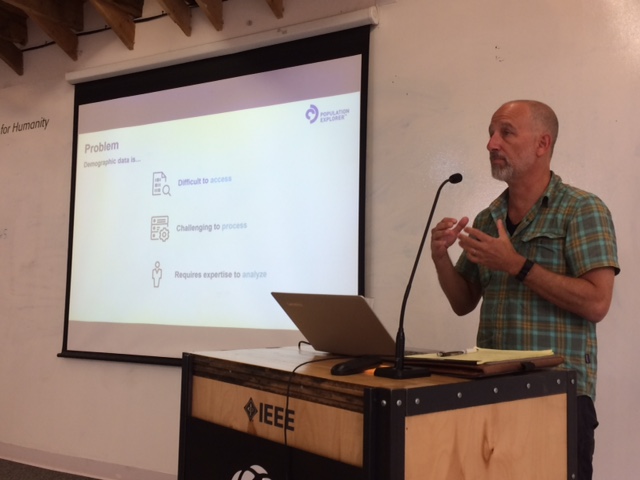Kimetrica’s Journey with Population Explorer

When the Indian Ocean Tsunami struck on December 26, 2004, many in the humanitarian sector were off celebrating the holidays. They quickly mobilized, but lacked basic data to inform the response, including an accurate estimate of the number of people affected. Kimetrica Chief Operating Officer Rob Rose was floored by this lack of accessible data. He and a team of colleagues at Kimetrica set out to find the answer, and were able to come up with a good estimate within three weeks. The Kimetrica team wasn’t satisfied; the aid sector needs actionable data much faster than three weeks.
Thus began Kimetrica’s journey with Population Explorer, a robust and easy-to-use online platform that provides detailed age and gender data for every square kilometer on earth. The Posner Center community had the opportunity to hear directly from Rob Rose and Population Explorer strategist Kyle Weaver at a Development Dialogue in June, as they shared the creation, modification, and future of this tool.
Early Funding & Subsequent Changes
Rob Rose shared the early development and subsequent changes that Population Explorer has undergone. The project was first funded by USAID, who utilized the tool as a part of the Famine Early Warning Systems Net (FEWS Net). Kimetrica strengthened the tool with USAID’s support, but funding was cut in 2016. They continued to provide the tool freely and soon realized that there were many commercial users of this tool. In 2017, they transitioned to a subscription service that is now used by companies across sectors, and including everything from startups to Fortune 500 companies. FEMA also uses the tool following every natural disaster to guide planning & response efforts.
Despite clear commercial interest in Population Explorer, Kimetrica shared that their heart is in the aid and development sectors, and they want it to serve these communities. They are currently working to build their subscription base commercially and to secure additional investment to bolster the product and allow for free or low-cost humanitarian sector use.
Population Explorer in Action
Kyle Weaver then took some time to demonstrate how Population Explorer works, drawing on examples from eWaterPay and Acasus. Acasus used Population Explorer to create heat maps of Balochistan Province in Pakistan, identifying areas away from main roads that had the greatest concentrations of infants and toddlers for a vaccination campaign. Equipped with this data, they worked with the government to strategize and reach as many children as possible. eWaterPay has used the technology to identify the best location for a well, combined with their innovative technology for collecting payments from users that are reinvested into water system maintenance.
Kimetrica then took some time for questions and ideas from the audience, who shared their ideas for ways they would utilize Population Explorer, or recommended features that would provide them with important data for decision-making. Kimetrica shared that the next global data set will be income data, which is of interest to both their commercial and development customers. Weaver surprised attendees by sharing that Posner Center Tenants and Members can get a Population Explorer license for free, ongoing. They are thrilled to offer this resource to our community and also invite our continual feedback and ideas for how to improve the tool so it continues to meet the needs of development professionals.
Posner Tenants and Members – to learn how to get a free Population Explorer license, email us at and we’ll get you connected to the right folks at Kimetrica!
Thanks again to Rob Rose and Kyle Weaver for presenting and for so generously sharing this tool. Stay tuned for updates on important upgrades to Population Explorer and how it’s being used to drive planning and strategy for global development.
